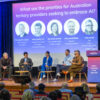One could argue that higher education has gone from being a rite of passage for the privileged few, to now being more directly connected to the need to close skills gaps. The over-riding sense is that education increasingly needs to meet people, both learners and employers, where they are at. This means both in the multiple and continuous life stages of their turning to learning, and the skills they need for its primary purpose for them of being productive in a changing world of work. Meeting learners where they are at increasingly means through technology and at work and at times that suit them and through the facilitation of others. It has long left being an absolute requirement for it to be on campus, face to face only, and at times that suit us and our systems.
Changing higher education for good
If you have any questions, suggestions or news please get in touch.





